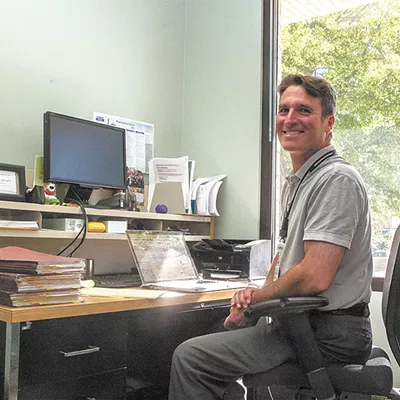Every morning, Monday through Friday, 33-year-old Jesus Martinez makes a pot of Folgers Classic Roast for the regulars at the Alcoholics Anonymous meetings in downtown Spokane.
"When that pot's done, honey, pour me a to-go," a gray-haired lady at the bar says. She lights a cigarette, trembling between her fingers, before she teeters outside.
The tip jar rattles.
Martinez is stocky and soft-spoken with wavy black hair falling past his shoulders and a rosary dangling around his neck. He likes it here behind the counter at the Alano Club, a clean and sober nonprofit where he's been volunteering since September. This place is the closest he's felt to home in a long time.
In 2001, Martinez pleaded not guilty by reason of insanity (NGRI) for a violent, drug-induced crime. He's now entering his 14th year of an indefinite commitment at Eastern State Hospital. For now, he has the court's permission to leave the grounds for short periods — including to serve coffee at the Alano Club — but he doesn't know if he'll ever leave the hospital for good.
Martinez is one of as many as seven new plaintiffs in a civil rights lawsuit pitting NGRI patients against the state of Washington. The suit alleges that current restrictions on NGRI patients at Eastern and Western State hospitals violate their constitutional and civil rights to adequate mental health treatment and release.
He joined the suit after one of the plaintiffs was permanently discharged from Eastern because his commitment was found unconstitutional. The case is scheduled to go to trial next October.
All of the additional plaintiffs in the suit are either no longer mentally ill or dangerous, says Emily Cooper, an attorney at Disability Rights Washington, an advocacy group and co-counsel for the plaintiffs. "This isn't lawyers making these judgment calls; these are their own doctors saying this," she adds. "It defies logic that even one person who doesn't have mental illness should be confined at a mental health hospital. ... We're not talking about one. We're talking about several."
Martinez's current diagnoses: major depression, with a history of psychotic features and polysubstance abuse. Both, his doctors say, are in full remission. Martinez hasn't taken psychiatric medication in about eight years. He's currently petitioning the court, for the second time, for his final release from the hospital.
"I feel blessed overall, but I'm still stuck," he says. "I don't feel there's much treatment left for me at the hospital."
Just before 11 am, Martinez makes his first surveillance phone call to Eastern State. He makes sure to call on time. Once, he called 10 minutes too late; the hospital almost alerted the police.
"Hey, Kathy," he murmurs. "It's Jesus calling in."
When — or if — Martinez leaves the hospital, his dream is to open a food truck. He'll start his business in his hometown of Moses Lake before expanding across the state. He'll paint it blue — his favorite color. Perhaps he'll even liven up the exterior with a mural like the one he did in the geriatric unit at the hospital — a panoramic landscape brimming with purple mountains, lush forests and clear lakes. He's heard that the patients there find it calming.
He'll serve a rotating menu inspired by his favorite Asian and Mexican dishes, like pan-fried rice, noodles and teriyaki chicken, plus his mother's posole. And he'll make pastries. Croissants, danishes and donuts.
"My family's nickname for me is gordo — fat," he says with a faint smile.
He doesn't know what he'll call his food truck. He hasn't put too much thought into that. What about Gordo's?
"Yeah," he says. "That would be good."
Martinez grew up a block away from two churches on a mostly quiet street in a Catholic family. He and his siblings were raised by his mother, a loving and hard-working woman who picked apples and packed produce.
But his childhood was plagued by violence. He got in fights at school and parties. Eventually, he was kicked out of Moses Lake High School at age 14. By then, he was experimenting heavily with hard drugs and alcohol. Meth, cocaine, crack, heroin, acid, speed, 'shrooms, cigarettes laced with embalming fluid — "the list goes on and on," he says. He was high almost all the time, working multiple jobs under the table and rarely sleeping. It wasn't long before the hallucinations started. First, he heard laughter. Then he heard commands.
On April 22, 2000, Martinez, then 18, hopped into a car with two girls he'd just met at his mother's yard sale. He was already high on pot and cocaine when they offered him a hit of chalky blue meth from a plastic baggie. The next thing he remembers is waking up, bleary-eyed and foggy, in a Grant County jail cell.
According to court records, Martinez entered the home of 84-year-old Melvin Johnson that day. He stabbed the man 12 to 15 times with a knife and a screwdriver; stole his cash; and drove off in his 1983 Chrysler New Yorker. After the attack, Johnson's health deteriorated, and he died two years later.
Martinez's public defender read him the charges: assault, burglary and robbery in the first degree. For the next year and half, Martinez was shuttled between jail and Eastern State Hospital, detoxing from years of heavy drug use.
At the time of the commission of Martinez's crime, a doctor determined he was suffering from cannabis dependence, methamphetamine abuse and schizoaffective disorder. On Aug. 16, 2001, Martinez was acquitted of all charges by reason of insanity and committed to Eastern State Hospital.
In the prison system, Martinez, a first-time offender, would have faced a nine-year maximum sentence. He would have been eligible for parole after 14 months. Instead, he's entering his 14th year at Eastern.
Martinez remembers the first time he asked the judge for a final discharge in April 2010. His family was on one side of the courtroom; Johnson's family was on the other. His attorney told him not to look in their direction. Before the hearing, Johnson's son did an interview with a TV reporter. "It's scary to think this guy might be running around this town or your town," he said.
Martinez says he would feel the same way.
"I can't take it back. I can't say 'sorry' to that person. I can't change how they feel," Martinez says. "But that's not who I am. That's an incident that happened in my life, and not who I am or who I want to be."
Martinez learned to cook from his mother, who learned to cook by taste and smell alone. She can't read, so she has never used recipes. But she made the best tamales and the best mole Martinez has ever had. As a boy, Martinez would sit in the kitchen with her and watch her at the stove.
"Seeing the smile on her face," he says — that's his favorite memory. By age 5, Martinez was making breakfast for his baby sister while his mother was at work: Jimmy Dean sausages, scrambled eggs, French toast and coffee. He was always making coffee.
He's going to his mother's house on Thanksgiving Day — his first time home in 14 years. This year, he'll make the turkey and the trimmings. ♦






















